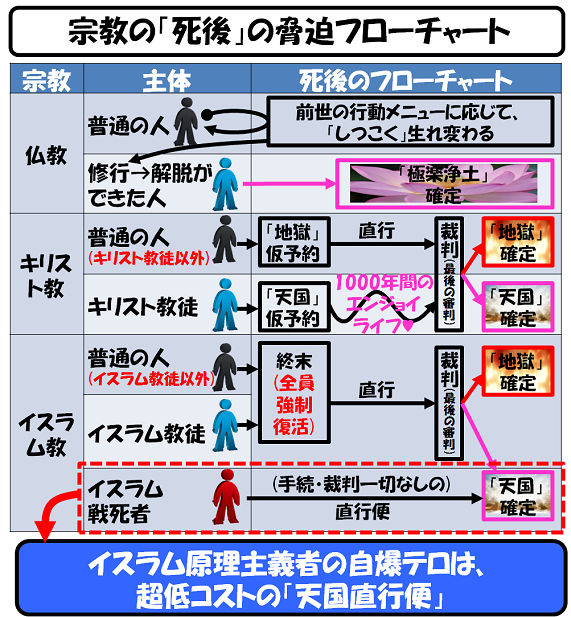書くべきか、書かないべきか、本当に迷ったのですが ―― 油の煮えたぎった釜の中に投じられる覚悟で記載してみます。
I wondered whether I should write about it, but I'm prepared to be thrown into a cauldron of simmering oil and try to describe it.
『北朝鮮に対して、なんの条件も付けることなく、拉致被害者1人の返還に対して、20億円を支払う』
"We will pay North Korea 2 billion yen for the return of one abductee without any conditions attached."
というような解決策を唱えている人がいないかなぁ、と調べてみましたが、現時点で、見つけられませんでした。
I have looked to see if anyone is advocating such a solution, but at this time, I have not found one.
-----
我が国の政府が、この措置を取れない理由は、いくらでも挙げることができます。
One can cite any number of reasons why our government cannot take this step.
一言で纏めれば、『我が国がテロに屈した』ことになります。
In a nutshell, this means that "our country will succumb to terrorism.
(「テロ」というと、どこかに大義がありように見えるので、むしろこれは「卑劣にして悪辣」と言うべきでしょう)
("Terrorism" makes it seem like there is a cause somewhere, so I would rather call this a "despicable and vicious nation.")
このような解決(テロ国家との交渉)は、法治国家としての日本国の威信を著しく低下させることになります。
Such a solution (negotiations with a terrorist state) would seriously diminish the prestige of Japan as a nation governed by the rule of law.
さらに、国連決議に違反して、他国の領空を許可なく通過させるようなミサイルをバカスカ打ち上げている国家に、軍事費の支援をすることにもなります。
Furthermore, it would mean providing military spending support to a nation that, in violation of UN resolutions, foolishly launches missiles that pass through the airspace of other nations without permission.
参考文献:「K君の話」
Reference: "K-kun's Story."
K君の話
そして最悪のシナリオは、日米安全保証条約の破棄、日米韓国軍事連携の崩壊です。
The worst-case scenario involves the abrogation of the Japan-U.S. Security Assurance Treaty and the collapse of the Japan-U.S.-South Korea military partnership.
-----
ただ、このような事例が『これまでに一度もなかったか』と言われれば、そうでもないのです。
However, if you ask whether such cases have 'never happened before,' it is not so.
典型的なのが、これです。
This is a typical case.
私、この週末に、「超法的措置」の法的根拠を、かなり真剣に探しました
今回、再度調べてみたら、色々分かりました。
This time, I looked into it again and found out a lot.
(1)2003年に民主党が「緊急事態基本法」の構想を提案したことがある
(1) In 2003, the Democratic Party of Japan proposed the concept of a "Basic Law on Emergency Situations.
(2)しかし、この「緊急事態基本法」は法律として成立していないため、現在の日本の法律体系においては、緊急事態における政府の裁量権に関する明確な法的根拠は存在しない。
(2) since the "Basic Law on Emergency Situations" has not been passed, the current Japanese legal system lacks a clear legal basis for the government's discretionary authority in emergencies.
(3)上記(1)(2)より、緊急事態における政府の行動は、現行の法律や憲法の枠組み内での判断と解釈に依存することになる。
(3) From (1) and (2) above, government action in a state of emergency will depend on decisions and interpretations within the framework of existing laws and the Constitution.
ふむふむ、なるほど。つまり、明文化されていないけど、政府には超法的措置を施行する権限が、慣例的に認められている、ということらしいです。
Hmmm...I see. So, it seems the government is customarily authorized to enforce extra-legal measures, although it is not explicitly stated.
と、いうことは、
And so, I can say,
政府が、拉致被害を『緊急事態』であると認定すれば、北朝鮮の拉致被害者を『身代金と交換に奪還する』ということは、"論理的には可能"である
"If the government recognizes the abductions as a state of emergency, it is "logically possible" to "recover the North Korean abductees in exchange for ransom."
ということですね。
-----
私は、この解決法が良いとは思っていません。
I do not believe this solution is a good one.
日本国民全体の国益としては、むしろ悪いと思えます。
It doesn't seem suitable for the Japanese people's national interest.
それに、北朝鮮が交渉に応じる可能性については、全く未知数です。
Besides, the possibility of North Korea agreeing to negotiations is entirely unknown.
とはいえ、こういう発言をする国会議員が1人や2人くらいいてもいいのではないか、と思うのです。
Nevertheless, I think there should be at least one or two members of Congress who make these kinds of statements.
(ちゃんと調べたら、こういう発言をした議員はいるかもしれませんので、ご存知の方は私に教えて下さい。というか、政府(内閣府とか外務省)は、多分、もう検討済みだろうと思う)
(A legislator may have made these statements if I did my research correctly. If you know of any, please let me know. Besides, I think the government (Cabinet Office or Ministry of Foreign Affairs) has probably already considered it.)
こういう話を言語化してしまえば、私たち国民も『国会が本気になって、政府を叩き始めた』と実感できると思うのです。
If we verbalize these stories, we, the people, will realize that 'the Diet is severe and has started to beat the government.
私には、『こういう発言で、一度、日本中を大炎上させる』ことくらいしか、この問題を動かす方法が思いつけませんでした。
The only way I could think of to move the issue along was to 'send the whole country into flames once with a statement like this.
-----
現在、政府が、拉致問題にどれほどの予算を付けているのかは、私は知りません。
I do not know how much the government is currently budgeting for the abduction issue.
ですので、私なりに「数字を回してみました」
So, in my way, I "turned the numbers around."
仮に、全ての日本人が、この問題に対して、1回に限り1万円を負担するとして、1.257億人 x 1万円 = 1.257兆円。
Assuming that every Japanese person will bear 10,000 yen for this issue at one time only, 125.7 billion people x 10,000 yen = 1.257 trillion yen.
1.257兆円(12570億円 ÷ 20億円) = 628.5人分。
1.257 trillion yen (1257 billion yen ÷ 2 billion yen) = 628.5 persons.
現在日本国政府が公式に認定している北朝鮮拉致被害者数は17名です。
Currently, the number of North Korean abductees officially recognized by the Japanese government is 17.
民間の機関の調査結果では、470人という説もあります。
Some private institutions have suggested that the number is 470.
-----
『江端の提案は、乱暴で、安直で、単純で、低能すぎる』という批判は、甘んじて受ける覚悟です。
I am prepared to accept the criticism that "Ebata's proposal is too wild, straightforward, simplistic, and low.
しかし、私を含めて、国民のほとんどは、この問題の難しさや複雑さを理解していません。
However, most of the public, myself included, does not understand the difficulty and complexity of this issue.
私は、ほぞを噛み続けながらニュースを見るのが、辛いのです。
I have a hard time watching the news by biting my tongue.
ならば、いっそのこと『乱暴で安直で単純で低能』でもいいから、"ここ"から始めてみるのは、どうでしょうか?
Then, how about starting from "here," even if it is "wild, straightforward, simple, and low"?

